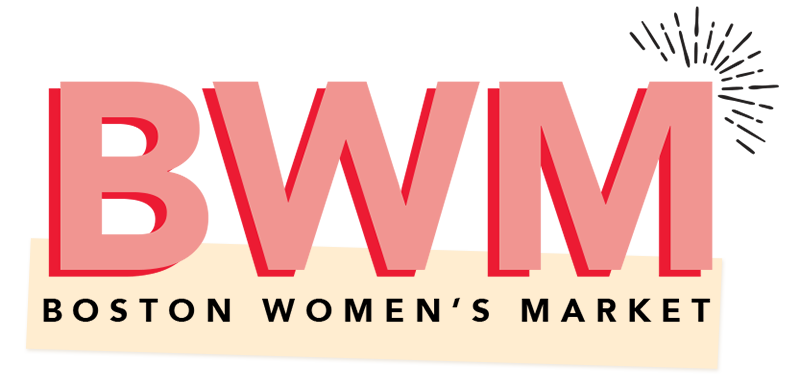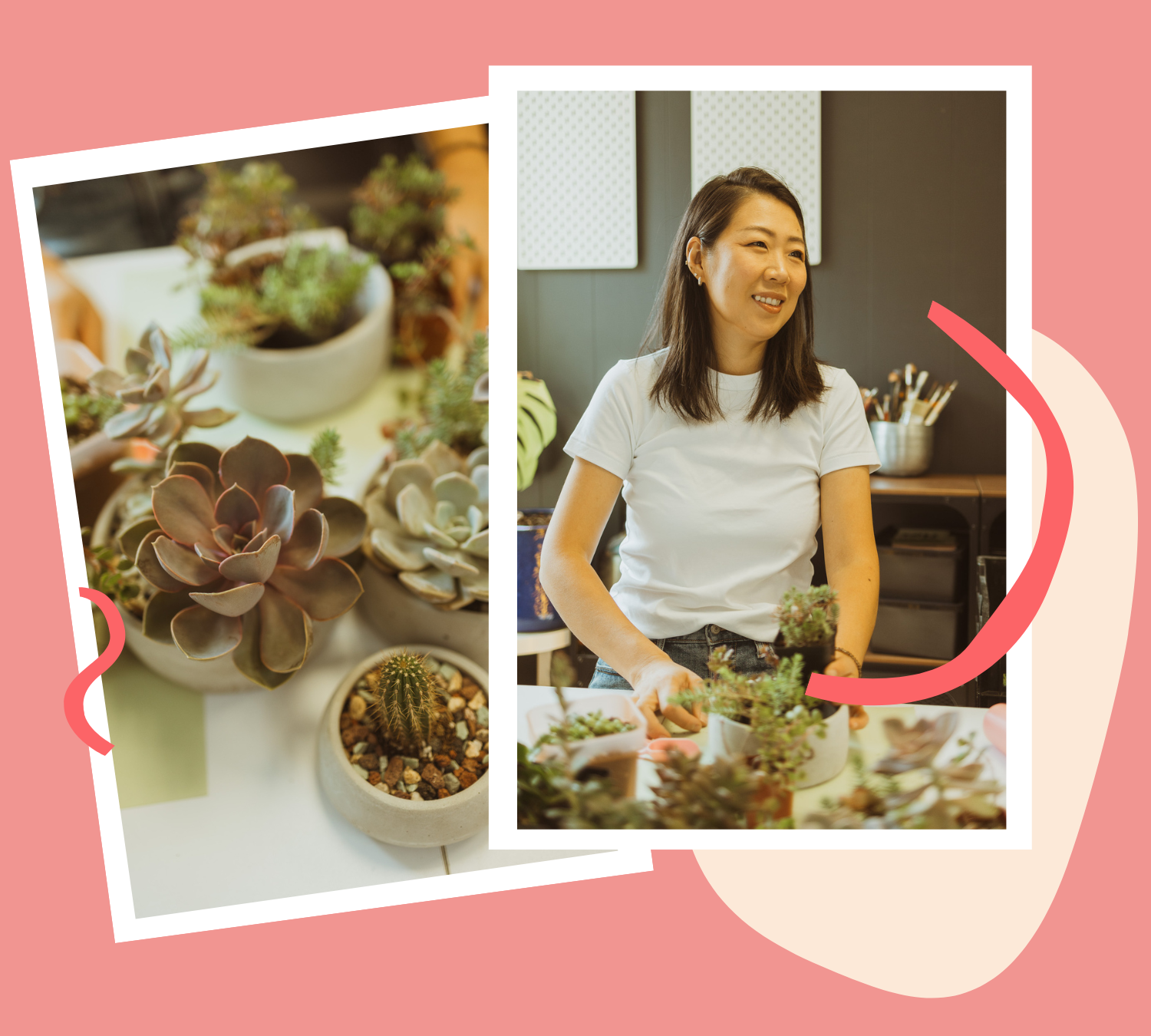Meet Wild Violet Fibers
FOUNDED BY
THE INTERVIEW
Written by Boston Women’s Market & Erica Lange
Boston Women’s Market: Can you tell us a bit about what led you to begin your journey with Wild Violet Fibers? Was there an aha! Moment?
Erica Lange: My fiber journey started in 2011 when I first learned to knit and crochet during a study abroad program in the UK. Fast forward to 2020 and I started to experiment with natural dyeing. Around this same time, I was diagnosed with type 1 narcolepsy. This chronic sleep disorder made it increasingly difficult to keep up with my full-time job and I eventually had to walk away from my professional career. I knew I still needed a purpose and a creative outlet primarily focused in the fiber arts. The aha moment came when my husband and I bought a house with wild violets in the yard and a kitchenette in the garage. I knew this would become my dye studio and Wild Violet Fibers was born.
BWM: For many women starting out in the entrepreneurial world, there can be a lot of self-doubt. Do you have any personal stories about how you conquered self-doubt? What guidance would you give to others?
Erica: I still experience a lot of self doubt, especially when it comes to social media. It’s so hard for me to gauge how much people want to see of me versus my art. I ask myself questions like: Am I likable? Should I share this? Will anyone see what I post? Social media can be such a powerful tool but also has many flaws and downsides. I am currently in the process of seeking help to guide me going forward. So the advice I would give to others is that it’s ok to ask for help.
I also experience creative self doubt. Like many artists, I can be very critical of my work. I try to channel this self-criticism in a productive direction by asking myself what it is that I don’t like. I use that to inform what I’ll do in a new batch. I used to want to perfect my ideas before introducing them to the world, but now my primary goal is to try something new and discover something new with each new batch of yarn. It’s a worn expression, but don’t let the perfect be the enemy of the good. Experimentation is necessary in order to evolve and perfection is a state of stasis, not evolution.
BWM: Many women begin their small business journey as a way to seek fulfillment they may not be getting in their 9-5 job. Others aren't sure where to begin and need help "digging deeper" to find what it is that fills their cup. What are some steps someone can take today to begin that journey of discovery?
Erica: One of the most useful resources that I used to help inform my direction with Wild Violet Fibers is Manoush Zomorodi’s ZigZag Project podcast. The podcast dropped at a pivotal moment for me, just as I had left my job and was still considering what I wanted to do next with my life. It consists of six episodes that guide the listener on a path of self-discovery from an initial self-assessment, to brainstorming your values and interests, and finally connecting the dots to create an achievable path forward. There is homework involved but I would highly recommend that anyone at a crossroads in their life check out this podcast.
BWM: We think the stories of failure are just as important as the stories of success. Can you talk about a time that you failed in an entrepreneurial venture or objective? How did you face and overcome this failure? What was the lesson learned?
Erica: Most of my entrepreneurial “failures” are disappointing or lackluster markets. It can be so disheartening to put in all the work to vend at a market only to potentially lose money on the cost of the event. Of course you never know how any market is going to go, but when it seems clear that things aren’t going well I try to at least walk away from the day with some kind of positive or lesson learned. Was there a customer interaction that went well? Did I meet a new, interesting vendor? Were people not interested in my product or were there simply not enough people there that day? These takeaways help inform what markets I pursue in the future and what products to have on hand.
BWM: Do you have a favorite moment so far with Wild Violet Fibers? Where you really felt like you were on the right path?
Erica: I absolutely love seeing what people make with my yarn. It makes my day when someone posts about a project they're working on with my yarn on social media. So far my favorite moment is when someone came to one of my shows in a sweater that they had made with my yarn purchased at a previous show! It was so special to see how my yarn was worked up in-person and that this person had worn this garment that day just to come see me at my show. I get such a buzz of excitement and fulfillment when people use and love what I’ve made.
BWM: How have you continued to manage the growth of your business while also finding time and ways to invest in yourself?
Erica: Over the past (almost) two years that I’ve been in business, I’ve made strategic investments in equipment to make the dyeing processes easier and more efficient. This allows me to dye more yarn in a more streamlined process, which frees up some of my time to work on other projects, including designing patterns and pursuing new ideas for the business.
BWM: From one small business owner to another, what is your favorite go-to business tool or resource you can recommend to our community?
Erica: Shopify is my go-to business tool. Since I sell my yarns online through my own website and in-person at festivals and markets, it’s critical to have a sales platform that handles both in order to have sales data all in one place and keep inventory organized. I would absolutely suggest that anyone currently using another platform or sales system check out Shopify, especially if they have multiple sales channels and a lot of inventory to manage.
BWM: What is your go-to Podcast or book of the moment ( besides your own of course!)?
Erica: Recently, I have gotten very interested in learning more about pigments and colors, even if they are not used as dyes for yarn. I have read and greatly enjoyed The Secret Lives of Color by Kassia St Claire, The Color Bible by Laura Perryman, and The Brilliant History of Color in Art by Victoria Finlay. I would highly recommend these three books to anyone interested in color, art, art history, and design.
BWM: Anything else you'd like to share?
Erica: Being in business for myself has been difficult, exciting, challenging, and rewarding. I think it takes an extraordinary act of courage and leap of faith to decide to pursue your passions and work for yourself. I am constantly evolving as an artist and a business woman and I believe that I am on the path of becoming who I am most meant to be. If you’re thinking about going into business for yourself, take the time to weigh your options and decide if it’s the right choice for you. It’s not easy, but I am happier working for myself than for anyone else.

























